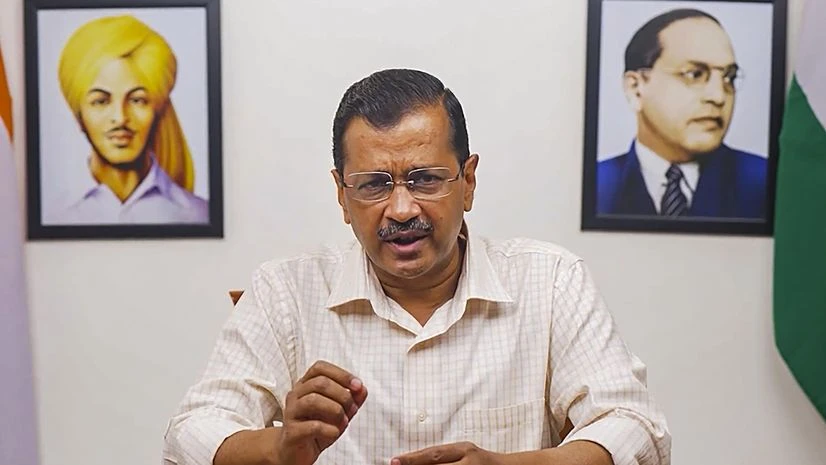The Supreme Court, on May 10, is set to deliver its verdict regarding Delhi Chief Minister Arvind Kejriwal's request for interim bail in a money laundering case linked to the alleged excise policy scam.
Aam Aadmi Party (AAP) chief Kejriwal was arrested by the Enforcement Directorate (ED) on March 21 and is currently held in Tihar Jail under judicial custody.
A Bench of Justices Sanjiv Khanna and Dipankar Datta will preside over the proceedings.
On Thursday (May 9), the ED filed a new affidavit opposing Kejriwal's interim bail request, particularly citing his intention to campaign for elections. The ED argued that electioneering cannot be justified as grounds for bail, as it does not constitute a fundamental or legal entitlement.
Furthermore, the ED emphasised that granting bail in this scenario would set a wrong precedent.
In response, the AAP lodged a complaint with the Supreme Court’s registry denouncing the ED’s affidavit as a “blatant disregard of legal procedures”, considering that the matter is already slated for a final decision in the top court on Friday.
More From This Section
What did SC say in the Kejriwal hearing on May 7?
A Bench of Justices Sanjiv Khanna and Dipankar Datta had noted, "He is the Chief Minister of Delhi. Elections are on going. This is an extraordinary situation. It is not like he is a habitual offender. We will consider on priority whether he should be released in the interim."
However, the Bench had said there was no harm in campaigning and he was not involved in any other case.
The top court said that national elections are held once every five years, though politicians should not be treated separately. "Elections are around the corner, and we are thinking from that perspective," the Bench said.
The court told Kejriwal's counsel, "We want to make it clear. Even if we release you on interim bail, we don’t want you to perform any official duties as Chief Minister. It is your choice to continue as CM. It will lead to a conflict of interest if any decisions are taken regarding functioning of the government. We cannot allow that. If we are releasing you, it is only for the purpose of elections.”
The court also expressed its concern over the delay in the completion of the investigation and called for the production of files by the Enforcement Directorate.
Delhi HC’s refusal of Kejriwal’s bail plea in liquor scam case
On April 9, the High Court dismissed his plea for release from jail and rejected his argument of political vendetta amid the looming Lok Sabha elections. The High Court had said that Kejriwal's absence from nine ED summons over six months undermined any claims of special privilege as Chief Minister, suggesting his arrest was an inevitable consequence of his non-cooperation.
How is the Delhi government being run after Kejriwal’s arrest?
Kejriwal holds no portfolios, and cabinet meetings have not taken place since his arrest. The Delhi Assembly has also not convened during this period. Individual Ministers are managing their respective departments.
The party is currently concentrating on its election campaign, with Kejriwal’s wife, Sunita Kejriwal, leading the poll campaigning.
Here’s a timeline of events leading to Arvind Kejriwal’s arrest
November 2021: The new excise policy is implemented by the Delhi government, aiming to reform the sale and distribution of alcohol in the city, drawing ire from different segments for promoting risky health habits.
July 2022: After Delhi's Chief Secretary expressed concerns about significant policy violations, the Delhi Lieutenant Governor ordered a CBI probe.
August 2022: The CBI conducts raids targeting the then Deputy Chief Minister Manish Sisodia and three others. Soon after, the ED starts a money laundering case related to the liquor policy.
September 2022: Vijay Nair, the Aam Aadmi Party's communications head, is arrested by the CBI.
February 2023: The Central Bureau of Investigation (CBI) arrests former Delhi Deputy Chief Minister Manish Sisodia.
March 2023: ED arrests Sisodia
October 2023: AAP leader Sanjay Singh is arrested by the Enforcement Directorate. The probe agency issues its first summons to Delhi Chief Minister Arvind Kejriwal.
December 2023: ED issues second summons to Delhi CM.
January 2024: ED issues third and fourth summons to the AAP convenor.
February 2024: ED issues four summons to Kejriwal on Feb 2, 14, 23, and 27, respectively. Kejriwal refuses to appear before the agency.
March 16, 2024: Bharat Rashtra Samithi leader K. Kavitha is arrested by the ED
March 21, 2024: The ED issues a ninth summons to Delhi CM, and the Delhi High Court denies him protection from arrest. ED arrests Kejriwal from his residence at night.
April 9, 2024: Delhi High Court denies interim bail relief to the Delhi CM
April 10, 2024: Kejriwal moves Supreme Court for bail petition

)
